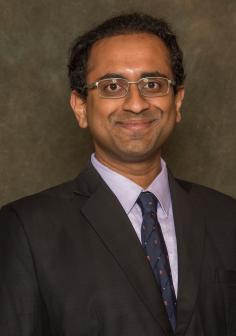
Communications and Signal Processing Seminar
Advancing Machine Learning for Imaging: Regularization and Robustness
This event is free and open to the publicAdd to Google Calendar

Abstract: In this talk, we present our work on improving machine learning for image reconstruction on three fronts: i) learning regularizers, ii) learning with no training data, and iii) ensuring robustness to perturbations in learning-based schemes.
First, we develop an approach for supervised learning of sparsity-promoting regularizers for inverse problems, where the parameters of the regularizer are learned to minimize reconstruction error on a paired training set. Training involves a challenging bilevel optimization problem with a nonsmooth lower-level objective. We derive an expression for the gradient of the training loss using the implicit closed-form solution of the lower-level variational problem given by its dual problem, and provide an accompanying exact gradient descent algorithm (dubbed BLORC). Our experiments show that the gradient computation is efficient and BLORC learns meaningful operators for highly effective denoising.
Second, we investigate the deep image prior (DIP) scheme that recovers an image by fitting an overparameterized neural network directly to the image’s corrupted measurements. To address DIP’s overfitting and performance issues, recent work proposed using a reference image as the network input that led to improved reconstructions. However, obtaining the reference often requires supervision. Hence, we propose a self-guided scheme that uses only undersampled measurements to estimate both the network weights and input image. We exploit regularization requiring the network to be a powerful denoiser. Our self-guided method gives significantly improved reconstructions for MRI with limited measurements compared to recent schemes, while using no training data.
Third, recent studies have shown that trained deep reconstruction models could be over-sensitive to tiny input perturbations, which cause unstable, low-quality reconstructed images. To address this issue, we propose Smoothed Unrolling (SMUG), which advances a deep unrolling-based reconstructor using a randomized smoothing (RS)-based robust learning operation. RS, which improves the tolerance of a model against input noises, has been widely used in the design of adversarial defense for classification. SMUG customizes the RS operation to the deep unrolling architecture and improves the robustness of MRI reconstruction with respect to diverse perturbations including in the measurements, or with different measurement sampling rates, and different iterations of unrolling.
We conclude with a brief highlight of ongoing research directions such as machine learning for rapid data acquisition in MRI, or for analyzing brain waves from EEG during meditation, etc.
Bio: Saiprasad Ravishankar is currently an Assistant Professor in the Departments of Computational Mathematics, Science and Engineering, and Biomedical Engineering at Michigan State University. He received the B.Tech. degree in Electrical Engineering from the Indian Institute of Technology Madras, India, in 2008, and the M.S. and Ph.D. degrees in Electrical and Computer Engineering in 2010 and 2014, respectively, from the University of Illinois at Urbana-Champaign, where he was then an Adjunct Lecturer and a Postdoctoral Research Associate. From August 2015, he was a postdoc in the Department of Electrical Engineering and Computer Science at the University of Michigan, and then a Postdoc Research Associate in the Theoretical Division at Los Alamos National Laboratory from August 2018 to February 2019. His interests include biomedical and computational imaging, machine learning, inverse problems, signal and image processing, data analysis, and optimization. He has received multiple awards including the Sri Ramasarma V Kolluri Memorial Prize from IIT Madras and the IEEE Signal Processing Society Young Author Best Paper Award for 2016 for his paper "Learning Sparsifying Transforms" published in the IEEE Transactions on Signal Processing. A paper he co authored won a best student paper award at the IEEE International Symposium on Biomedical Imaging (ISBI) 2018, and other papers were award finalists at the IEEE International Workshop on Machine Learning for Signal Processing (MLSP) 2017 and ISBI 2020. He is currently a member of the IEEE Computational Imaging Technical Committee and has served as Guest Editor for the IEEE Signal Processing Magazine. He has organized several special sessions or workshops on computational imaging and machine learning themes including at the Institute for Mathematics and its Applications (IMA), the IEEE Image, Video, and Multidimensional Signal Processing (IVMSP) Workshop 2016, MLSP 2017, ISBI 2018, and the International Conference on Computer Vision (ICCV) 2019 and 2021.
***Event will take place in hybrid format. The location for in-person attendance will be room 1008 EECS. Attendance will also be available via Zoom.
Join Zoom Meeting https: https://umich.zoom.us/j/91414297851
Meeting ID: 914 1429 7851
Passcode: XXXXXX (Will be sent via e-mail to attendees)
Zoom Passcode information is also available upon request to Michele Feldkamp ([email protected]).
 MENU
MENU 
